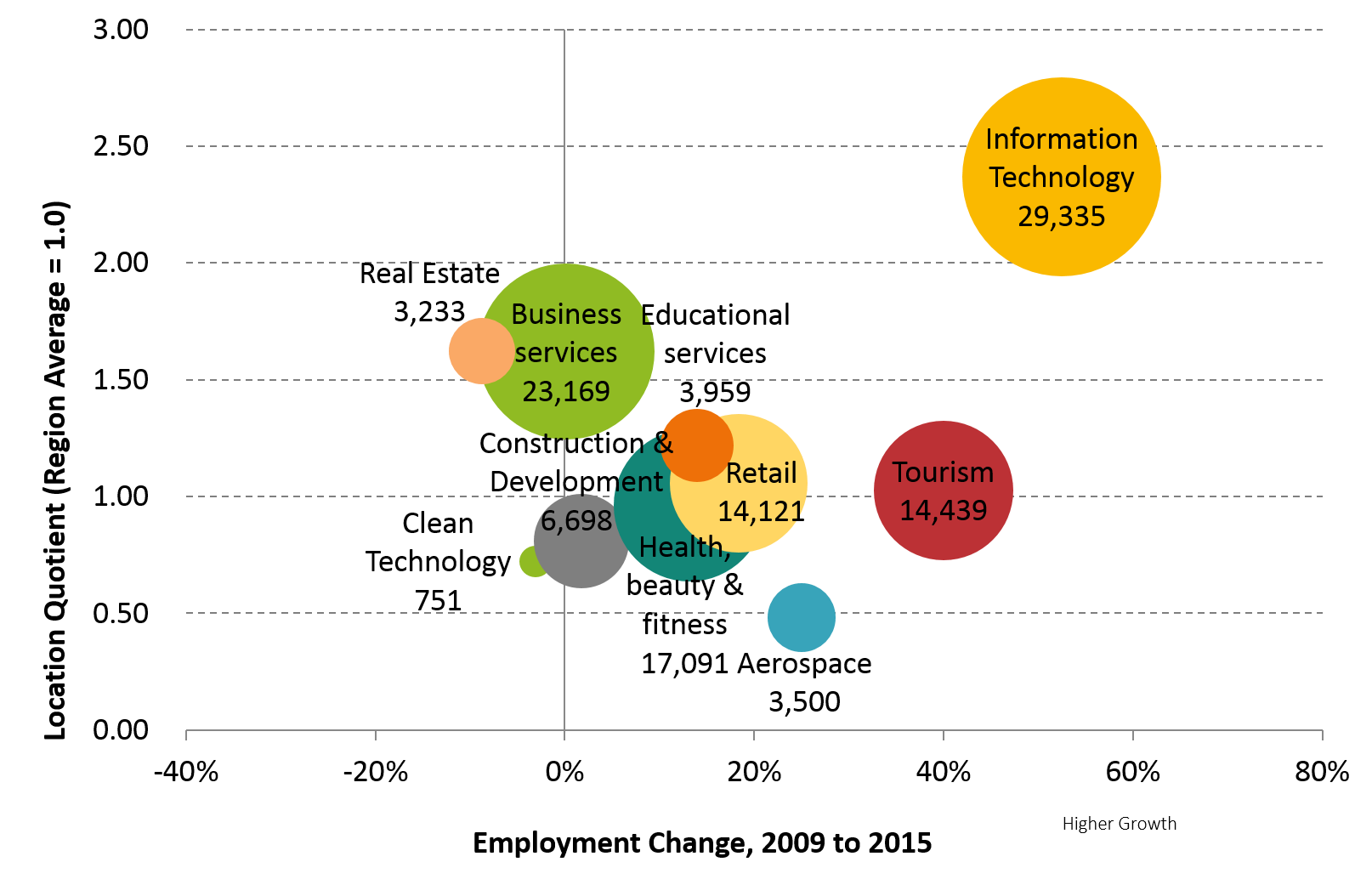
Bellevue’s economy is driven by four major industry clusters: Information Technology, Business Services, Retail and Tourism.
- Total Employment in 2015: The size of each circle represents the number of Bellevue jobs within the individual industry cluster in 2015.
- Employment Change from 2009 to 2015: The horizontal axis shows which industry clusters have grown or declined between 2009 and 2015.
- Location Quotient: The vertical axis compares the concentration of each industry cluster in Bellevue to the concentration of the same industry cluster in the Puget Sound region. A circle with a location quotient of 1.0 means that Bellevue has the same concentration of jobs in that cluster as the region. A location quotient of 2.4 (Information Technology is 2.37) means the cluster is 2.4 times more concentrated than the regional average, and 0.5 (such as Aerospace) means half the concentration.
Information Technology
As noted above, Information Technology is Bellevue’s biggest, fastest growing and most concentrated industry cluster in terms of employment. Employment in most IT sub-clusters in Bellevue is more than twice as concentrated as the regional average. The IT sector has had the most business openings of any sector in the last three decades and this trend is expected to continue.
A big part of why Bellevue’s technology sector continues to grow is because Bellevue has the talent to support expanding and new companies opening in our city. High quality talent is attracted to Bellevue and the greater Eastside because of the local amenities, safe communities, excellent schools, cultural diversity, natural environment and high quality of life. These attributes will continue to attract both talent and companies to Bellevue in the future. In 2016, the city witnessed expansion of local technology companies such as Valve, Concur and Pokemon, as well as new companies locating in Bellevue such as Salesforce and Alibaba.
Business Services
Business services are the second largest cluster in Bellevue in terms of employment. Finance is the largest Business Services sub-cluster, followed by Management Services and Architecture and Engineering. While Bellevue’s Finance sub-cluster is strong relative to the region, the region (including Seattle) is not considered to be a large financial center relative to other metro areas, such as Chicago, San Francisco and others.
Management Services includes headquarters for companies such as Eddie Bauer, Esterline, Paccar and Puget Sound Energy, as well as regional managing offices for companies such as QFC and Safeway.
Retail
Bellevue is one of the Puget Sound region’s premier high-end retail destinations, generating a substantial portion of retail sales from outside the community. Bellevue had the highest Taxable Retail Sales (TRS) per capita ($25,438 per person) of any major city in King County in 2012. Bellevue’s TRS per capita was nearly twice as high as Seattle’s in 2012.
Growing Bellevue’s retail sector is a key element of Bellevue’s tourism strategy as many visitors are attracted to Bellevue’s major shopping destinations such as the Bellevue Collection, the Bravern, Crossroads Bellevue and the Mall at Factoria as well as Bellevue’s auto dealers, and home improvement retailers.
The strength of Bellevue’s small neighborhood shopping centers is also vital, as they provide convenient access to essential goods and services for Bellevue residents. Neighborhood centers also serve as gathering places, which support community cohesion and help form neighborhood identity.
Tourism
Tourism is the second fastest growing industry in Bellevue just behind the technology sector. Currently the City of Bellevue’s Office of Economic Development is partnering with VisitBellevue and the Meydenbauer Center to develop a destination marketing strategy that will take a more focused approach toward further developing amenities that create unique memorable experiences and meet the needs of visitors coming to Bellevue.
